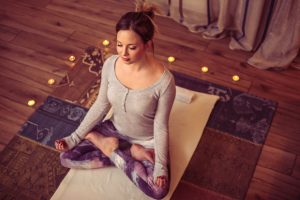
Major depressive disorder (MDD) is a chronic, recurrent, and disabling condition that is prevalent worldwide and is responsible for more years lost to disability than any other disease. As much as 40 percent of patients that are treated for depression with antidepressant medications do not achieve full remission, prompting researchers to explore alternative treatment options. This study analyzed the effect of Iyengar yoga—a form of yoga that focuses on detail, precision, posture, and breath control—on the symptoms of those with major depressive disorder.
Volunteers with MDD were randomly assigned to either a high dose or low dose condition. The high dose condition consisted of attending three, 90-minute yoga classes a week as well as practicing the exercise at home, while the low dose condition had participants attend two 90 minute yoga classes and practice at home. Both the high dose and low dose groups saw significant reductions in their symptoms, though those in the high dose groups saw more reductions than those in the low dose group.
Despite this, the team asserts that the low dose condition of attending two yoga classes weekly as well as practicing at home could still effectively reduce depressive symptoms without taking up as much time as the high dose condition. Dr. Chris Streeter, the corresponding author of the study, explained, “This study supports the use of yoga and coherent breathing intervention in major depressive disorder in people who are not on antidepressants and in those who have been on a stable dose of antidepressants and have not achieved full resolution of their symptoms.”
These findings support the notion that depressive symptoms can be managed with non-pharmacological treatment methods, either as a replacement for or in addition to pharmaceutical interventions. Yoga may be a safe addition to an existing treatment regimen as patients do not need to worry about adverse side effects or drug interactions.
Related: Yoga may reduce chronic lower back pain